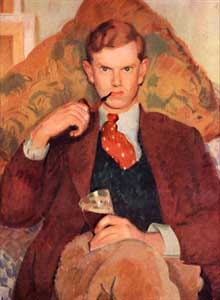I had once decided that I would not be reading Brideshead Revisited ever. I had a ruffle through the first pages and had decided it was not for me - Catholic classic or not. It felt boring, dry and extremely wistful. But I did end up reading it, obviously. And it happened as a part of a personal Reading Challenge I set for myself, to become familiar with Catholic literature. And guess which one was inevitably on every ‘Top 10 Catholic Fiction You Should Read’ list? Yep -Brideshead Revisited by Evelyn Waugh.
So I found myself a copy and worked through reading it and I use the phrase ‘worked through’ because that’s exactly what it was. Reading this book was hard work.
But it made its mark on me, and I don’t mean it lightly.
The premise and theme of the novel isn’t exactly a mystery. Waugh himself highlights it in the preface of the book that it deals with the ‘the operation of divine grace on a group of diverse but closely connected characters’. He added that such a theme ‘was presumptuously large, but I make no apology for it.’
And he didn’t have to, because it is powerful enough exactly as it is.
The book describes events set around the start of WWII when the British aristocracy is starting to fall apart as the threat of a war looms ahead. Waugh uses the protagonist Charles Ryder to peer in to the lives of the Marchmain family and their ways, beginning with his friendship with Lord Sebastian Flyte. Sebastian is introduced as a childish eccentric who later falls into alcoholism driven by guilt and conflicting emotions about his family and his inability to reconcile his desires with his faith. Charles is an outsider, fascinated by the ways of the privileged and is pleasantly satisfied to have close interactions with the Marchmains when Sebastian introduces him to his family. He notices that the members of the Marchmain family are far from perfect- Lady Marchmain has her stern and overbearing ways, Lord Marchmain who is separated from his wife (but not divorced) lives with his mistress in Europe, Brideshead ‘Bridey’, the elder son and heir is portrayed as serious and philosophical but without any sense of real direction in life, Julia, his sister is greatly reliant on appearances and public appeal and Cordelia, the younger sister and perhaps the only one who embodies the true and redeeming qualities of her faith.
The Marchmains are Catholics, who are very much aware of the greatness of their faith, but nevertheless struggle to balance it in accordance with their desires. Charles is smitten with the house, the Brideshead manor, with its art nouveau-style chapel and fresco-ed ceilings which deepens his love for architecture and art. Despite being an agnostic, he is fascinated with their attempts at a Catholic lifestyle (some more interested than others) even attending Holy Mass in the house chapel.

The plot is setup in three Books - the first is heavy with Charles’s nostalgia, laden with academic imagery of their Oxford years when Sebastian was in good cheer. This is followed by events which heighten Sebastian’s conflict within himself and his family’s ways and he indulges in excessive drinking, while Charles gets close with the Marchmain family. The last Book is perhaps a bit unpredictable with the characters, and Waugh shows the subtle attempts of grace to convert hearts.
Waugh lents Charles an almost disillusioned and jaded voice from the beginning of the novel, which lets the reader come to their own conclusions about the certainty of a few choices. It is clear that Charles doesn’t care too much for religion, but the beauty and grandeur of Brideshead manor and its chapel leaves a lasting impact on him. This vein alone is a wonderful example of evangelisation through beauty.
As the book features prominently on the list of great Catholic novels, one would expect that it is because Waugh had ladled on the rituals and tradition of Catholicism throughout the book, but that is far from the case. If anything, he has left plenty of margin for Catholicism to be criticized - for the agnostic, the book illustrates how religion ruins everything, but for the believer its a testament to God’s grace.
Throughout the novel, Waugh is ambiguous about his endorsement of Catholicism and at certain points, it is clear that he does not intend to proselytize, at least not in the traditional way. But the novel progresses and terminates in a way that illustrates the gentle hand of grace that has a hold on the Marchmains and subsequently, on Charles.
Perhaps the best way to convey it is in the words of Chesterton whom Cordelia quotes in the book -
‘Father Brown said something like ‘’I caught him’’ (the thief) ‘’with an unseen hook and an invisible line which is long enough to let him wander to the ends of the world and still to bring him back with a twitch upon the thread.’’
This ‘twitch upon the thread’ is made evident to the reader in the choices made by the characters towards the end of the book. By the end of the novel, we have signs that Charles has converted to Catholicism.
The name of the book is also considered as a symbolic nod to Catholicism, according to scholars.
Joseph Pearce notes that the bride’s head being the bridegroom, is a signifier for Christ himself. And so Brideshead revisited is, therefore, Christ revisited.
And if we consider this, then it would mean that Charles’s return to the faith is perhaps the final twitch upon the thread in the novel.

Waugh himself was a Catholic convert and did not mean the book for any particular audience, even though some things in it are better caught on by Christians. The novel is highly praised even among secular audiences for its ‘dark academia’ undertones, the heavy nostalgia and the use of literary prose.
Christopher Hitchens, the famous journalist (and atheist), sought to understand why Brideshead had such a hold on the imagination and concluded that in addition to Waugh’s brilliant writing, it imbibes a ‘yearning for a lost or different upbringing that is fairly universal’ and thus contributed to its sense of nostalgia.
I can’t help but wonder that perhaps, the secular reader might be aghast by the decision of the characters to return to the Catholic faith after noticing how unhappy it made them all. But it should be noted that it wasn’t really Catholicism that doomed the Marchmain family -it was their attempts to search for personal happiness & contentment outside it that lead to despair and gloom.
There is no doubt that the novel is dazzlingly multi-dimensional. There's much to ponder about the power of beauty, the impetus of grace and the murkiness of sin, all in the backdrop of friendship and faith.
George Weigel called it Waugh's 'sacramental' novel.
It is just that- sacramental - a literary means to open hearts to think of spiritual realities and Divine Providence in a world rampaged by darkness and sin.
I still find myself reading bits of it during odd moments, especially the last few pages before the epilogue and I could write more about it, but I’m afraid you’ll have to read the book to get to know the story in all its brilliance.
But really, it all comes down to the ‘small red flame’ of hope we harbor even among the direst situations, the power of good literature and beauty to move hearts. And of course, grace - the true protagonist of the book.
Speaking of, it goes without saying that one can study about grace and its gentle workings from St. Aquinas or St. Augustine, but to look at it through painted words, Brideshead Revisited is a good place to start.





excellent post! thanks. made me want to read! unfortunately i only have a german translation. ive also had it on my list for a while but have never even attempted to start. the catholic classic ive tried a few times to start but havent been able to break into is kristin lavranstochter.